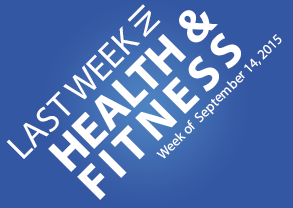 Hello again! We’re back with another round of the best health & fitness articles from last week. For the uninitiated, I pull together five of the most informative, interesting, and beneficial articles that have crossed my browser over the last seven days so you don’t have to bother with juggling your weight loss research with everything else going on in your life.
Hello again! We’re back with another round of the best health & fitness articles from last week. For the uninitiated, I pull together five of the most informative, interesting, and beneficial articles that have crossed my browser over the last seven days so you don’t have to bother with juggling your weight loss research with everything else going on in your life.
This week we’ll cover a handful of tips you can use to keep pushing yourself, whether you really need lactose or not, some high-fiber foods that help you lose weight, why you should work pull ups into your upper body workout, and if whole grains are a necessary part of your diet.
Best Health & Fitness Articles From Last Week
7 Tips to Push Yourself Harder
Results follow performance, so if you don’t advance your workouts, then your results will stagnate.
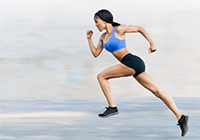 Whether you’re just starting a workout regimen or you’re a seasoned veteran, staying motivated and moving towards your goals can be the toughest part of working out. There are some days where you just don’t want to go to the gym or that you’re so bored with your program that it’s no longer enjoyable. If you don’t shake things up, you’re running the risk of losing your momentum and that can be super hard to get back. Follow these 7 tips to keep pushing yourself to get the results you deserve.
Whether you’re just starting a workout regimen or you’re a seasoned veteran, staying motivated and moving towards your goals can be the toughest part of working out. There are some days where you just don’t want to go to the gym or that you’re so bored with your program that it’s no longer enjoyable. If you don’t shake things up, you’re running the risk of losing your momentum and that can be super hard to get back. Follow these 7 tips to keep pushing yourself to get the results you deserve.
- Have a Goal: Set yourself a clear end game for what you’re working towards. Your goal should be specific, clear, concise, and attainable. Rather than just saying, “I want to lose weight.” make your goal, “I’m going to lose 20 pounds.”
- Have a Plan: Goals don’t achieve themselves. You need a plan of action to strategically attack your goal so you aren’t spending energy working in the wrong direction.
- Switch it Up: If you find yourself becoming comfortable with your workout program or you’re finishing it too quickly with not enough burn or fatigue, you’re starting to plateau. Your body’s getting stronger. What worked three weeks ago isn’t as effective today. Pick up the intensity, do more reps, or take less breaks.
- Focus on All the Pieces: Don’t neglect your body. When you’re working out, your body needs rest and proper nutrition as much as the exercise itself. If you put in unhealthy foods or don’t get enough sleep, your body will tell you that you’re messing up loud and clear.
- Get Reinforcements: Supplements aren’t just for elite athletes or endurance training, everyone that exercises can benefit from them. Certain supplements can help you recover faster, stay more hydrated, and give you more energy for longer, harder workouts.
- Stay Motivated: Weight loss journeys and event training regimens are just as much a mental exercise as a physical one. Keeping a sharp, focus mind dedicated to your original goal is one of the best weapons in your arsenal.
- Stay Safe: There’s good pain and then there’s bad pain. Pushing yourself too hard is a good way to get injured. Listen to your body. If what your doing doesn’t feel right, stop. Take a breather. Figure out what’s going on and if it keeps up, go to a doctor. Catching an injury while it’s still minor can keep your recovery time to days or weeks rather than months or years.
Do You Actually Need Lactose?
For most people lactose presents nary an issue, but an estimated 20 percent of folks in the U.S. suffer from lactose intolerance, according to the National Institutes of Health.
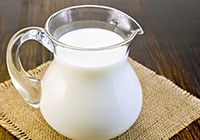 For a lot of Americans, dairy and milk products makes up over 2/3 of our calcium intake which is super important for bone health, healthy nerve impulses, blood clotting, and heart rhythm. This puts people with lactose intolerance at a distinct disadvantage as they have to source their calcium and lactose from multi-vitamins, supplements, or other foods. Why is lactose so important? It helps absorb and retain key minerals like calcium, magnesium, zinc, and manganese which all contribute to your overall health and physical development, especially children.
For a lot of Americans, dairy and milk products makes up over 2/3 of our calcium intake which is super important for bone health, healthy nerve impulses, blood clotting, and heart rhythm. This puts people with lactose intolerance at a distinct disadvantage as they have to source their calcium and lactose from multi-vitamins, supplements, or other foods. Why is lactose so important? It helps absorb and retain key minerals like calcium, magnesium, zinc, and manganese which all contribute to your overall health and physical development, especially children.
14 High-Fiber Foods That Help You Lose Weight
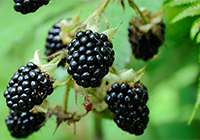 So, there are two types of fiber; soluble and insoluble. Soluble fiber absorbs water while slowing digestion, which makes you feel full so you eat less. Insoluble doesn’t absorb water and passes through your system quickly, along with anything else it passes along the way. Eating foods that are high in either type of fiber (fruits, veggies, grains, beans, etc.) is great for your digestion and helps you get fit. Not only that, but those same foods have a smorgasbord of other health benefits to boot.
So, there are two types of fiber; soluble and insoluble. Soluble fiber absorbs water while slowing digestion, which makes you feel full so you eat less. Insoluble doesn’t absorb water and passes through your system quickly, along with anything else it passes along the way. Eating foods that are high in either type of fiber (fruits, veggies, grains, beans, etc.) is great for your digestion and helps you get fit. Not only that, but those same foods have a smorgasbord of other health benefits to boot.
4 Reasons You Should Do Pull-Ups
 There aren’t many exercises out there that work as many muscles at one time as a single pull up. Pull ups work your shoulders, triceps, biceps, lats, forearms, and various smaller back muscles. Yes, they’re tough, but it’s hard to argue with the results. If you can’t do pull ups right now, there are numerous modifications to help offset your bodyweight and get that chin up over the bar. If you’re looking to get a ripped upper body, work in pull ups. You won’t regret it.
There aren’t many exercises out there that work as many muscles at one time as a single pull up. Pull ups work your shoulders, triceps, biceps, lats, forearms, and various smaller back muscles. Yes, they’re tough, but it’s hard to argue with the results. If you can’t do pull ups right now, there are numerous modifications to help offset your bodyweight and get that chin up over the bar. If you’re looking to get a ripped upper body, work in pull ups. You won’t regret it.
Reasons to do Pull Ups
- Functional Strength: As pull ups are a compound exercise working many different muscles, you’re strengthening your body to better perform a variety of movements like standing, walking, pushing, pulling, turning, and twisting.
- Improves Your Posture: With a stronger back and core, you’ll stand up a bit straighter making you look longer and leaner.
- Alleviates Back Pain: Most people sit all day at work and all this sitting can wreak havoc on your back. Pull ups strengthen your back which reduces the load and lowers your chance for injury.
- Better Looking Physique: Pull ups define all those prestige muscles that’ll make you look good in a tank top, or shirtless for that matter.
Do You Really Need Whole Grains in Your Diet?
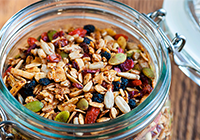 As diets like paleo and gluten-free grow in popularity, more and more people are missing out on the health benefits from whole grains. That being said, whole grains aren’t necessary and the health benefits can easily be replaced by upping your intake of fruits and veggies, but you have to eat them to get said benefit. Otherwise, get to chomping down whole grains like brown rice, quinoa, corn, oatmeal, and barleys.
As diets like paleo and gluten-free grow in popularity, more and more people are missing out on the health benefits from whole grains. That being said, whole grains aren’t necessary and the health benefits can easily be replaced by upping your intake of fruits and veggies, but you have to eat them to get said benefit. Otherwise, get to chomping down whole grains like brown rice, quinoa, corn, oatmeal, and barleys.
